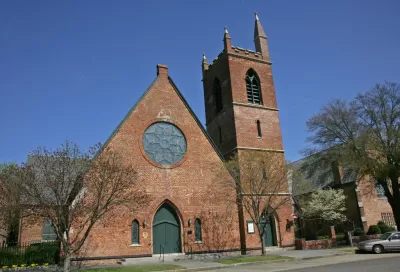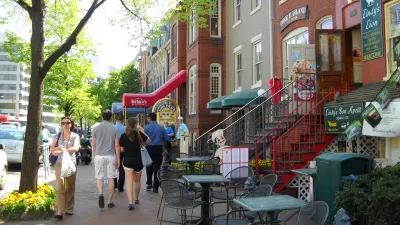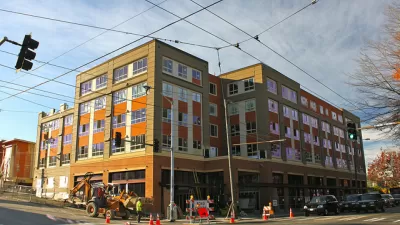Churchgoing in Washington, D.C. is on the decline, and neighborhood churches are finding it hard to pay the bills. One solution is to go mixed-use and share space with new development.

Church attendance isn't what it once was in central Washington, D.C. Dan Reed writes: "Once upon a time, congregations could anchor neighborhoods, but nowadays they can feel like a void. Because many are open just a few hours a week for Saturday and Sunday services and the occasional weeknight meeting, nearby sidewalks are empty because nobody has a reason to stop in."
That can make neighborhoods with a lot of churches seem more dangerous for pedestrians, dampening prospects for development. Reed cites a recent example of how an old church partnered with housing developers to build a combined structure. The building looks pretty unconventional, but the arrangement may let churches stay open.
"Congregations get a space that fits their current needs as well as the money to take care of it while carrying out their mission. Developers snag sought-after building sites plus a sympathetic partner able to win over abutters who may fight new construction in their back yard."
FULL STORY: Why Developers Are Eyeballing DC’s Churches As Their Next Project

Planetizen Federal Action Tracker
A weekly monitor of how Trump’s orders and actions are impacting planners and planning in America.

Maui's Vacation Rental Debate Turns Ugly
Verbal attacks, misinformation campaigns and fistfights plague a high-stakes debate to convert thousands of vacation rentals into long-term housing.

Restaurant Patios Were a Pandemic Win — Why Were They so Hard to Keep?
Social distancing requirements and changes in travel patterns prompted cities to pilot new uses for street and sidewalk space. Then it got complicated.

In California Battle of Housing vs. Environment, Housing Just Won
A new state law significantly limits the power of CEQA, an environmental review law that served as a powerful tool for blocking new development.

Boulder Eliminates Parking Minimums Citywide
Officials estimate the cost of building a single underground parking space at up to $100,000.

Orange County, Florida Adopts Largest US “Sprawl Repair” Code
The ‘Orange Code’ seeks to rectify decades of sprawl-inducing, car-oriented development.
Urban Design for Planners 1: Software Tools
This six-course series explores essential urban design concepts using open source software and equips planners with the tools they need to participate fully in the urban design process.
Planning for Universal Design
Learn the tools for implementing Universal Design in planning regulations.
Heyer Gruel & Associates PA
JM Goldson LLC
Custer County Colorado
City of Camden Redevelopment Agency
City of Astoria
Transportation Research & Education Center (TREC) at Portland State University
Jefferson Parish Government
Camden Redevelopment Agency
City of Claremont





























